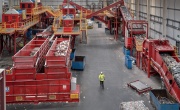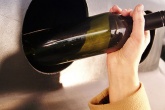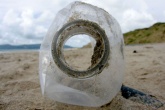Study backs behaviour change campaigns to combat litter in Scotland
Behaviour change campaigns are being backed as measures to reduce littering levels by the Industry Council for research on Packaging & the Environment (INCPEN).

Conducted by Keep Scotland Beautiful, the study was carried out across 120 sites in Edinburgh, Falkirk, Renfrewshire and Inverness. INCPEN claims that the results indicate a new approach is needed in Scotland to address levels of littering, and that carrier bag charges are not reducing litter.
INCPEN, which has been vocal in its opposition to consumer charges, states that the findings suggest charges do not change the behaviour of the people who litter, as the study found that supermarket carrier bags, though very few in number, have gone up. However other items that do not carry a charge have gone down – for example, the number of drinks containers was found to have decreased by 18 per cent and coffee cups by 36 per cent.
Smaller items of litter were most common, with cigarette butts and gum making up the bulk of the total litter count. The next highest was paper (nine per cent), sweet wrappers (six per cent), soft drink cans (six per cent), and plastic soft drink bottles (six per cent).
Jane Bickerstaffe, CEO of INCPEN, commented on the study, saying: “Two years on from the introduction of the carrier bag charge, the litter problem is as bad as ever. The charge does not appear to influence people who litter.
“It suggests that more charges and deposits on other items, such as disposable coffee cups and drinks bottles, will not make a difference.”
Make it ‘socially unacceptable to litter’
Following the results of the study, INCPEN has called for innovative approaches to engage communities and change behaviour to be used rather than financial incentives. It points to Hubbub’s Neat Streets campaign, supported by INCPEN, which ran a campaign in London to test initiatives, as an example to follow.

Commenting on this latest report, though, Bickerstaffe emphasised a need for a fresh way of addressing the problem: “There are many good local campaigns and initiatives but what’s needed is a long-term national programme that makes it socially unacceptable to litter anything.
“INCPEN recommends that governments look at how we change the behaviour of litterers, so everyone is proud of their environment and everyone puts all rubbish in a bin or takes it home.”
Deposit-return schemes
INCPEN’s preference for community action rather than charges is not a surprise as the group has spoken out against the Scottish Government’s consideration of a deposit-return scheme (DRS) in the past.
A DRS would see customers pay a small cash deposit of around 10 pence when purchasing a drink in a can or bottle, which is refunded when the packaging is returned for recycling – boosting the country’s recycling quality and rates while reducing litter.
 Last November, Caroline Lucas MP and Co-Leader of the Green Party joined other voices calling for a DRS, saying they are used in 11 other European countries with recycling rates for target materials in excess of 90 per cent. Her motion noted that plastic bottle and cans account for 40 per cent of litter in the UK, with a staggering 38.5 million plastic bottles being used every day.
Last November, Caroline Lucas MP and Co-Leader of the Green Party joined other voices calling for a DRS, saying they are used in 11 other European countries with recycling rates for target materials in excess of 90 per cent. Her motion noted that plastic bottle and cans account for 40 per cent of litter in the UK, with a staggering 38.5 million plastic bottles being used every day.
Scotland’s Environment Secretary, Richard Lochhead, had called in June 2015 for a DRS to reduce litter and improve recycling, but the system was opposed by stakeholders in the Scottish packaging industry. The British Plastics Federation said that the evidence from other countries indicates that DRSs are very expensive to introduce, have a high cost for local councils, and can cause inconvenience for consumers, and could undermine existing kerbside collections and penalise customers who already recycle at home.
Packaging Recycling Group Scotland (PRGS) said that the initial Scottish Government proposal “fails on nearly every practical level and ignores current consumer behaviour”, and emphasising the need to “strengthen existing recycling and anti-litter initiatives.”
Following findings that nearly 80 per cent of Scots support the introduction of such a scheme, though, the Scottish Government announced early last year that it would continue investigating opportunities to implement a DRS, following opposition from the packaging industry.









